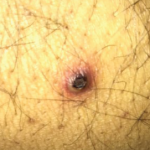NEW YORK (Reuters Health)—Anti-TNF drugs are more likely to improve growth in children with inflammatory bowel disease (IBD) if they’re given in the earlier stages of puberty, new findings show.¹
Children who achieve remission are also more likely to have satisfactory growth, the research team reported online on Sept. 21 in the Journal of Pediatric Gastroenterology and Nutrition.
Pediatric IBD, especially Crohn’s disease, can stunt growth, but some studies have found infliximab and adalimumab to be associated with better short term growth, Dr. Fiona Cameron of the University of Edinburgh, Scotland, and colleagues write in their report.
To better understand the effects of infliximab and adalimumab on growth in pediatric IBD, the researchers looked at 195 youngsters who started biological therapy in Scotland from 2000 to 2012. Eighty-five percent had Crohn’s disease, 14% had ulcerative colitis, and 1% had unclassified IBD. The median age at diagnosis was 11 years.
The children received a total of 240 courses of therapy.
Growth data from 12 months before biologic therapy initiation to 12 months after were available for 93 of the 191 patients on infliximab, and 28 of 49 patients on adalimumab.
Eighteen percent of the patients on infliximab had severe growth failure at the study’s outset. The patients on infliximab who achieved remission showed significant improvement in median height standard deviation score (HtSDS), change in HtSDS, and height velocity (HV).
Patients in Tanner stages 1–3 had an increase in change in HtSDS and HV, while patients in stages 4 or 5 had no significant change in HtSDS and a decrease in HV.
Growth was better in patients who received infliximab for at least 12 months compared to those who were on the drug for a shorter period. Male patients showed greater improvements in growth than females. Patients who had IBD for longer than two years and those who received azathioprine along with infliximab also had improved linear growth.
Patients treated with adalimumab also had increased height only at 12 months. Early stages of puberty (Tanner stage 2 and 3) were associated with increased change in HtSDS and HV—but no improvement was seen in those who were not on corticosteroids at baseline.
“Growth improves with greater disease control as can be seen in our results, where no improvement in growth was observed in those who did not achieve remission after induction,” Dr. Cameron and her team write. “In those that achieved remission post-induction, improvement was seen in all measures of growth suggesting that these patients may demonstrate catch-up growth now that the inflammatory process has been ‘switched off’ rather than the anti-TNF therapy agents themselves.”


